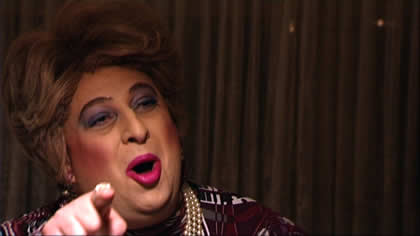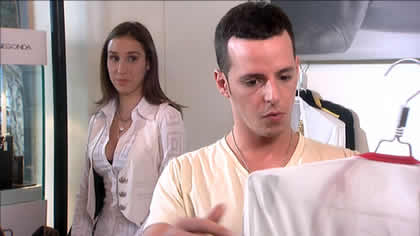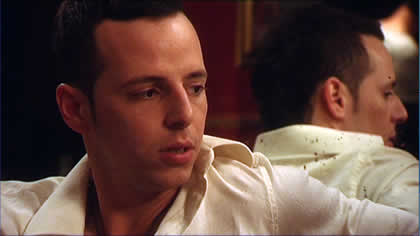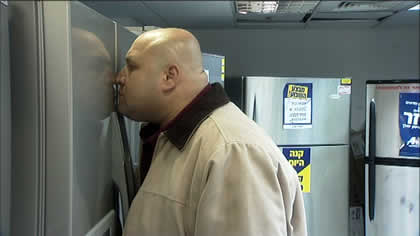In Antarctica, we follow the miserable Omer; he’s about to turn 30 and he hasn’t found love or his true purpose in life. However, he’s not looking very hard. He prefers to lose himself among the stacks of books at the local library and immerse himself in a series of delicious one night stands. He becomes intrigued by Danny, a young dancer, who energizes his libido but not his ambition. He resists the attentions of Ronen, a handsome journalist, who understands him and sparks his imagination.
So, who do you choose? Omer is just starting to get a handle on his own personal crisis when his little sister, Shirley, imposes her problems on the family. Under intense pressure to marry, she suddenly chooses to pursue a lesbian romance with Michal, her boss and owner of the city’s hippest coffeehouse. Omer and Shirley are looking for warmth and enlightenment – anything that will help to thaw the chill encapsulating their hearts. 
Only one person seems to have all the answers: Matilda Rose, a best-selling novelist and psychologist who believes that aliens are going to land in a small park in central Tel Aviv and reveal everyone’s best-kept secrets.
Born in Kfar Save, Israel, Yair Hochner served in the Israeli Defense Force. With the encouragement of notable directors Keren Yedaya and Tomer Heiman, Yair set out to direct his script, “Good Boys” (Yeladim Tovim) which received acclaim as the Winner of OUTstanding Emerging Talent Award at the Outfest, winner of the Showtime Vanguard Award, and the Jury Grand Prize at the International LGBT Film Festival in Montreal. The film received other awards such as Best Actor, Best Supporting Actress, Best Director, and Best Cinematography at the Tampa International Gay & Lesbian Film Festival and was named the Best Israeli Film at the Eilat International Film Festival.
Yair taught cinema to high school students for five years in Netania and moonlights as a writer and film critic for Israel’s leading cinema site, Seret. Yair also writes television reviews for Time Out Tel Aviv. He has written articles for Cinematheque Magazine as well as short stories for Tel Aviv newspapers and for Camera Obscura magazine. In June, 2006, he co-founded the first LGBT Film Festival in Tel Aviv, which has had continuing success each year.
Bijan Tehrani: Antarctica is a daring film, how did you come up with the idea of making it?
Yair Hochner: During 1999 at my last year in Camera Obscura – Art School in Tel-Aviv, I started to write the first draft of the script under the influence of my favorite film in that year, Michael Winterbottom’s “Wonderland”. It was about group of singles in Tel-Aviv, but I wanted to do a queer film so all the characters became gay & lesbian. I decided that I’ll do an homage to John Waters and Divine too. I think Antarctica starts like Mike Figgis experimental films, only with lots of sex and full frontal, then it becomes a realistic movie about loneliness in the big city, and suddenly romantic comedy with touch of camp. It contains a few genres in one movie.
 BT: For some people making a romantic comedy in that part of the world, where human life is always at risk, seems to be a bit strange. Of course I personally think life goes on for people regardless of the environment and situation they live in. How do you justify making of this film?
BT: For some people making a romantic comedy in that part of the world, where human life is always at risk, seems to be a bit strange. Of course I personally think life goes on for people regardless of the environment and situation they live in. How do you justify making of this film?
YH: Most of the people in Israel and especially in Tel-Aviv live very regular life; I think the Israeli audience is tired from Lebanese wars or Palestinian and Israeli conflict movies. We see it every day in the news; I think to make a movie that does not deal with those issues is itself a political statement. My movie is all about love, relationships and even marriage. As you know, gay marriage is not legal in my country, so I prefer to deal with this in optimistic way.
BT: After watching Antarctica, it reminded me of Italian- neo-realist cinema, of course it is a present day-neo-realist film. Do you agree? Tell us about the visual style of your film.
YH: A very smart observation. I am a big believer in realist filming. I prefer long single shots, cameras without tripods, and realistic lighting. Sometimes you can find an amazing light in the street or in the location and you don’t need professional equipment. I try to capture real moments in the heroes’ life. It’s stronger to see Omer and Danny in a one shot scene walking and talking and in this way show how their relationship builds as if it is a real time experience. But when you are doing such a thing you should have great actors and I’m very lucky to have that amazing cast.
BT: Actors’ performances in Antarctica are superb. Please tell us about casting of the film and how you worked with the actors. Did actors have to follow your script word by word?
YH: First of all, I need to say thanks to Yuval Raz, who plays Miki and helped me with the casting. The most important thing in independent movies for the directors is that the actors will be passionate  about the project and will totally trust the director. They are not getting a salary at the end of the day so they must have a great reason to be part of the movie.
about the project and will totally trust the director. They are not getting a salary at the end of the day so they must have a great reason to be part of the movie.
I don’t believe in rehearsals; we do doing lots of reading and meeting on coffee, talking about life, going out to movies—we are becoming best friends before the shooting. So during the production, it becomes evident in the film.
Some of the actors, like Tomer Ilan, Yuval Raz and Dvir Benedek and Danni Lachman, worked with me in my first feature “Good Boys”. Although the script is my baby, it’s not the bible, so if the actors have an idea I’m very open minded about it. During the shooting they are becoming the characters and they have better ideas. Like with the sentence “Alcohol makes you horny?”— This is Oshri Sahar’s ( Eitan) contribution to the script.
BT: How challenging was the making of Antarctica? Did you face any opposition from conservative groups during the making of the film or after the release of it?
YH: It was challenging but not because of any conservative groups. As an independent film-maker, I don’t get any support from the Israeli film fund, so no one cared about me… I could do what I ever wanted.
On the other hand, making an independent film forces you to compromise on the people that can make the movie happen, because sometimes they do not share the same vision you have for the movie.
When the movie came out, the press in Israel almost ignored it. I don’t know if it’s because it was released in one cinema in Tel-Aviv or homophobia or they thought it was too eccentric.  Even now that the movie is playing for the fourth month in the same cinema in Tel-Aviv, sold to more than 12 countries, and is going out in the cinema in the USA, no one is interested to interview me here. It’s quite depressing not to get recognition in my city.
Even now that the movie is playing for the fourth month in the same cinema in Tel-Aviv, sold to more than 12 countries, and is going out in the cinema in the USA, no one is interested to interview me here. It’s quite depressing not to get recognition in my city.
BT: How was the reaction of the Israeli audiences to the film?
YH: It was amazing. Most of the people even clapped hands during the credits in the end. I got so many emails and facebook messages from people from Israel and all over the world. It’s great. I also saw a few gay orthodox Jews that came to see it. This is the most exciting for me. I got some bad responses like “Why you are showing only sexy young men?” or “It’s only about sex and people will think that gay Israelis are easy going!” In my first film, some viewers complained why I’m showing rent boys and the dark, dirty side of the city. So I guess that everything that I’ll do will drag positive and negative responses so it’s more interesting like that.
You need to put things it in perspective: when you are doing a movie the most important thing is to do what you want and don’t think about what the audience will think.
BT: Has Antarctica been released outside Israel? How successful has it been among critics and festival fans?
YH: I been in NewFest (N.Y), Outfest (L.A) and Cardiff (UK) film festivals and the responses were great. Antarctica will be the opening night movie at Mix-Brazil and I’m attending there. I’m very excited about it. I think until now, the reviews in the US were pretty good. I hope that when the movie is released, the reviews of the main stream media will be good too. The movie starts in LA (Regent  Showcase Theater) on November 14th and after that will begin to show in cinemas in NYC (Quad) and more cities all over the country. You can find all the info over here:
Showcase Theater) on November 14th and after that will begin to show in cinemas in NYC (Quad) and more cities all over the country. You can find all the info over here:
BT: Please tell us about your future projects.
YH: First of all, I’m working on TLVFest – Tel Aviv’s International LGBT Film Festival, now in its 4th year, taking place June 23-27, 2009. Submissions should be received by March 1, 2009, so please send us movies, or just come visit Tel Aviv during the festival and support us.
Secondly, I took part in an amazing cinematic project that’s called “Fucking Different Tel-Aviv“, with another 15 Israeli Gay and Lesbian film-makers, and we got into Berlin International Film Festival 2009 in February. It is an anthology of short films about what gay people think about lesbian sexuality, and what do lesbians think about gay sexuality. I directed a 3 minute movie about a fight between two women – a left-wing demonstrator and right-wing orthodox one. I hope that I’ll shoot my next feature during July 2009. I’m waiting to see if I’ll get the finances.

